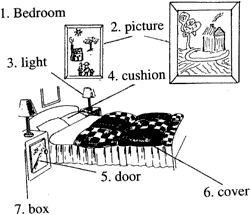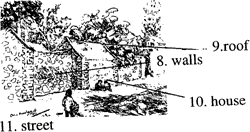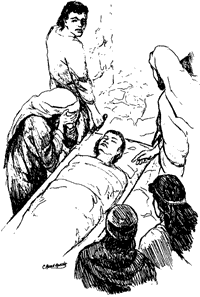Unit 13: Negatives
Negativas
Pictured Words
Palabras Representadas
New Words
Nuevas Palabras

| 1. bedroom
1. dormitorio |
| 2. picture
2. cuadro |
| 3. light
3. luz |
| 4. cushion
4. amortiguador |
| 5. door
5. puerta |
| 6. cover
6. cubierta |
| 7. box
7. caja |

| 8. walls
8. paredes |
| 9. roof
9. azotea |
| 10. house
10. casa |
Nouns
Sustantivos
creencia
frente
opinión
quién
carro
fruta
parada
discusión
ayuda
estiramiento
miedo
conocimiento
pensamiento
sensación
labio
uso
Adjectives
Adjetivos
doblado - derecho
limpie - sucio
general
brillante - obscuridad
plano
nuevo
pobre
Structure Words
Palabras De la Estructura
temprano
cómo
porqué
Sayings
Refranes
Is not this a poor house?
¿No está esto a la casa pobre?
Let me see a new house, please.
Déjeme ver una casa nueva, por favor.
There is one over there.
Hay uno allá.
That one.
Aquél.
This is not a new house.
Esto no es una casa nueva.
How much is it?
¿Cuánto es él?
May I not put the light on?
¿No puedo poner la luz encendido?
The light is over there.
La luz está allá.
Has not the bed a nice cover?
¿No tiene la cama una cubierta agradable?
Other forms of the negative
Otras formas de la negativa
There are other ways of saying the negative.
Hay otras maneras de decir la negativa.
In statements with the verb "to be" the word "not" may be put with it:
En declaraciones con el verbo "ser" la palabra "no" se puede poner con él:
Am I not to get you a place?
¿No soy para conseguirle un lugar?
Is there not Boaz?
¿No hay Boaz?
These are negative questions.
Éstas son preguntas negativas.
If we make them into negative statements they would be:
Si las hacemos en declaraciones negativas serían:
I am not to get you a place
No debo conseguirle un lugar
There is not Boaz
No hay Boaz
In each statement, "not" makes it negative.
En cada declaración, "no" la hace negativa.
Negatives with the verb "to have" also do the same thing as those with the verb "to be":
Las negativas con el verbo "a tener" también hacen la misma cosa que ésas con el verbo "para ser":
Naomi had a relation
Naomi tenía una relación
Naomi had not a relation
Naomi no tenía una relación
These statements are opposites.
Estas declaraciones son contrarios.
The first is positive and the second is negative.
El primer es positivo y el segundo es negativo.
Negative statements in the Present time (Tense) are made by using "do":
Las declaraciones negativas en el actual tiempo (tiempo) son hechas usando "":
but do not let him see you
pero no lo deje verle
do not go back to your mother-in-law with nothing in your hands.
no vaya de nuevo a su suegra con nada en sus manos.

The Widow's Son
El Hijo De la Viuda
And it came about, after a little time, that he went to a town named Nain;
Y vino sobre, después de un poco rato, eso que él fue a una ciudad nombrada Nain;
and his disciples went with him, and a great number of people.
y sus discípulos fueron con él, y una gran cantidad de gente.
Now when he came near the door of the town, a dead man was being taken out, the only son of his mother, who was a widow;
Ahora en que él vino cerca de la puerta de la ciudad, tomaban un hombre muerto hacia fuera, el único hijo de su madre, que era una viuda;
When the Lord saw her, he had pity on her and said to her, Be not sad.
Cuando el señor la vio, él tenía compasión en ella y dicho a ella, no sea triste.
And he came near, and put his hand on the stretcher where the dead man was: and those who were moving it came to a stop.
Y él vino cerca, y puso su mano en el ensanchador donde estaba el hombre muerto: y los que lo movían vinieron a una parada.
And he said, young man, I say to you, Get up.
Y él dijo, el hombre joven, digo a usted, se levanta.
And the dead man got up, and words came from his lips, And he gave him to his mother.
Y el hombre muerto levantado, y las palabras vinieron de sus labios, y él lo dieron a su madre.
Fear came on all, and they gave praise to God, saying, A great prophet is among us: and, God has given thought to his people.
El miedo vino en todos, y él dio la alabanza al dios, refrán, gran profeta de A está entre nosotros: y, el dios ha dado pensamiento a su gente.
Additional Reading
Lectura Adicional
The story of the Widow's Son comes to us from Luke who was a medical man and so we can think of his discussion as a responsible account of what took place there on that day.
La historia del hijo de la viuda viene a nosotros de Lucas que era un hombre médico y así que podemos pensar en su discusión como cuenta responsable de qué ocurrió allí en ese día.
In fact he makes use of some words which only a medical man could have knowledge of.
En hecho él hace uso algunas palabras de las cuales solamente un hombre médico podría tener conocimiento.
Even today, there is a place there for putting dead persons into holes among the rough stones and that is where the great number of people were going with the body of the dead boy.
Hoy uniforme, hay un lugar allí para poner a personas muertas en los agujeros entre las piedras ásperas y aquí es adonde the.great.number.of gente iba con el cuerpo del muchacho muerto.
The group would be loud in their cries and very sad, for that was usual with death.
El grupo sería ruidoso en sus gritos y muy triste, porque eso era generalmente con muerte.
It was the opinion of every one then that to put your touch on a dead man's carriage made you unclean, but Jesus did just that.
Era la opinión de cada entonces que poner su tacto en el carro de un hombre muerto le hizo sucia, pero Jesús hizo apenas eso.
So everyone stopped, of course.
Tan cada uno paró, por supuesto.
The place was near where the prophet Elisha gave new life to the boy that we had a story about in Unit 6: "On a Very Hot Day".
El lugar era cerca donde el profeta Elisha dio nueva vida al muchacho que teníamos una historia alrededor en la unidad 6: "en un día muy caliente".
This miracle therefore had special value to persons there.
Este milagro por lo tanto tenía valor especial a las personas allí.
They would hold the story of Elisha very dear to them, and that would have been another reason why they were saying, "A great prophet is among us: and, God has given thought to his people".
Llevarían a cabo la historia de Elisha muy querida a ellas, y ésa habría sido otra razón por la que decían, "un gran profeta está entre nosotros: y, el dios ha dado pensamiento a su gente ".
The important point, however, is that the prophet Elisha stretched himself seven times on the body of the boy, but Jesus only said "Get up" and the boy sat up.
El punto importante, sin embargo, es que el profeta Elisha se estiró siete veces en el cuerpo del muchacho, pero Jesús dicho solamente "se levanta" y el muchacho incorporado.
So, in the eyes of the people it was a much greater miracle.
Así pues, en los ojos de la gente era un milagro mucho mayor.
Jesus was very kind.
Jesús era muy bueno.
The word that was made use of with respect to his feelings has the idea of "being deeply moved in his heart".
La palabra que fue hecha uso con respecto a sus sensaciones tiene la idea "profundamente de la mudanza en su corazón".
So this story gives us some idea of how truly kind he was.
Tan esta historia nos da una cierta idea de cómo verdaderamente es bueno él era.
He did this to give help to the widow who would be completely dependent upon her son for her needs.
Él hizo esto para dar ayuda a la viuda que sería totalmente dependiente sobre su hijo para ella las necesidades.
He was not making himself seem important.
Él no se hacía se parece importante.
This story also has relation to a belief held by many people in those times.
Esta historia también tiene relación a una creencia llevada a cabo por mucha gente en esas épocas.
They thought that God had no sense of feeling.
Pensaron que el dios no tenía ningún sentido de la sensación.
But, Jesus let it be known by his act that God was very conscious of the needs of men.
Pero, Jesús la dejó ser sabida por su acto que el dios era muy consciente de las necesidades de hombres.
Helpful Notes
Notas Provechosas
| pity
compasión | having sadness of heart.
tener tristeza del corazón. |
| miracle
milagro | something not often seen.
algo visto no a menudo. |
| stretcher
ensanchador | a thing to take rest on.
una cosa para tomar resto encendido. |
| responsible
responsable | having a good relation with others.
tener una buena relación con otras. |
| account
cuenta | saying a story.
decir una historia. |
| conscious
consciente | having knowledge of the things around one.
tener conocimiento de las cosas alrededor de una. |